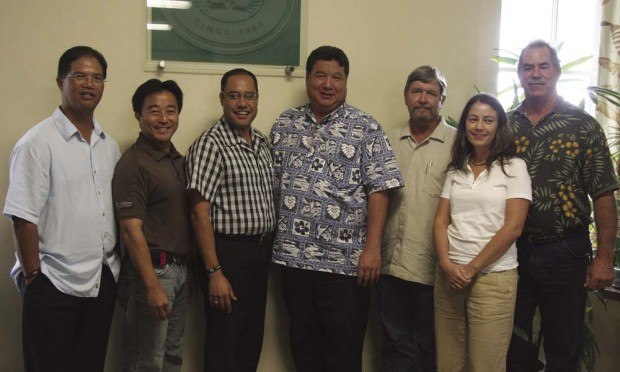PUHI — Agriculture has been a hot topic on Kaua‘i for quite a while. Since the sugar plantations started phasing out operations, there has been a lot of talk, and work, concerning diversified agriculture. A member of the state Senate
PUHI — Agriculture has been a hot topic on Kaua‘i for quite a while.
Since the sugar plantations started phasing out operations, there has been a lot of talk, and work, concerning diversified agriculture.
A member of the state Senate Agriculture and Housing Committee, Sen. Ron Kouchi, D-Kaua‘i-Ni‘ihau, toured the island Wednesday and Thursday, meeting with Kaua‘i agricultural stakeholders.
Committee Chair, Sen. Donovan Dela Cruz, D-Wahiawa-Hale‘iwa-Mokule‘ia, and Vice Chair, Sen. Glenn Wakai, D-Kalihi-Pearl Harbor-‘Aiea, also came to Kaua‘i, to hear stakeholder concerns.
On Thursday morning the senators met with East Kaua‘i Water Users’ Cooperative board members, and with Kaua‘i County Farm Bureau members.
The co-op is asking for $100,000 from the state to help improve the Hanama‘ulu ditch system. The money would be used in two annual installments of $50,000 each.
Co-op board member Jerry Ornellas said the mayor has been “very conservative” while mentioning at his inaugural address that the county could potentially irrigate 1,000 acres of farm land in Kalepa when the Hanama‘ulu ditch system is improved.
“Up to 3,000 or 4,000 acres can be irrigated if we put a pipe system in,” Ornellas said.
“Given the new energy initiative coming up, given the big push for self-sufficiency and food security on Kaua‘i, this really is going to be where our diversified ag is going to take place,” Ornellas said of the land in Kalepa.
The lands where the co-op is interested in improving the irrigation system were used for sugar cane fields operated by Lihu‘e Plantation. The state owns the land, and used to lease it to Lihu‘e Plantation, which has been closed since 2000.
The plantation had maintained the irrigation system, and when sugar stopped growing so did system maintenance.
“The initial plan from the state was no plan for any agriculture activity,” Kouchi said.
The state was going to abandon the irrigation system, but the co-op came forward and acquired the lease to keep the system working, said Kouchi.
The co-op, through community members, has been conducting volunteer work on the system, Ornellas said.
The Kaua‘i County Farm Bureau put together last fall a Commodity Committee, which prepared a list of issues to present the senators.
Wayne Katayama, from Kaua‘i Coffee and the Hawai‘i Coffee Growers Association, said ever since the Kaloko Dam broke in March 2006 there has been a large focus on administrative and safety standards for all reservoirs in the state.
The state Department of Land and Natural Resources on Nov. 22 approved a new set of administrative rules for inspection and maintenance of dams and reservoirs, Katayama said. With those rules, the DLNR also set a schedule for the impoundment of water and implementation of construction and improvement fees.
“The idea there was basically to fund the dam-safety office,” Katayama said.
This will put a extra burden on dam owners, who are basically the agricultural community, said Katayama.
“Ninety percent of the reservoirs are really used for agricultural water. However, the benefactors of the reservoirs are not limited to ag,” Katayama said.
The committee is saying that the new fee structure is a threat to agricultural property owners and those using water, and the issue needs to be addressed from a strategic view.
The committee said maintaining water infrastructure and upgrading it is critical to promote diversified agricultural growth.
Rodney Haraguchi, from the Kaua‘i Taro Growers Association, said 81 percent of all taro produced in Hawai‘i comes from Kaua‘i, most from Hanalei Valley.
Besides asking the senators to consider the co-op’s request for $100,000 funding, the committee also mentioned that repairs at the Hanalei River must be done soon, and be based on a study to evaluate best options to prevent future damage. The study is being conducted by local taro growers and the Natural Resources Conservation Service.
The cut in agricultural inspectors is also a concern for the committee, which asked for the positions on Kaua‘i to be reinstated.
Other issues brought by the committee included an update on oil barrel-tax money to make sure that agriculture benefits from it, plus concerns with production infrastructure support, trespassing and agriculture theft and support for agricultural marketing.


